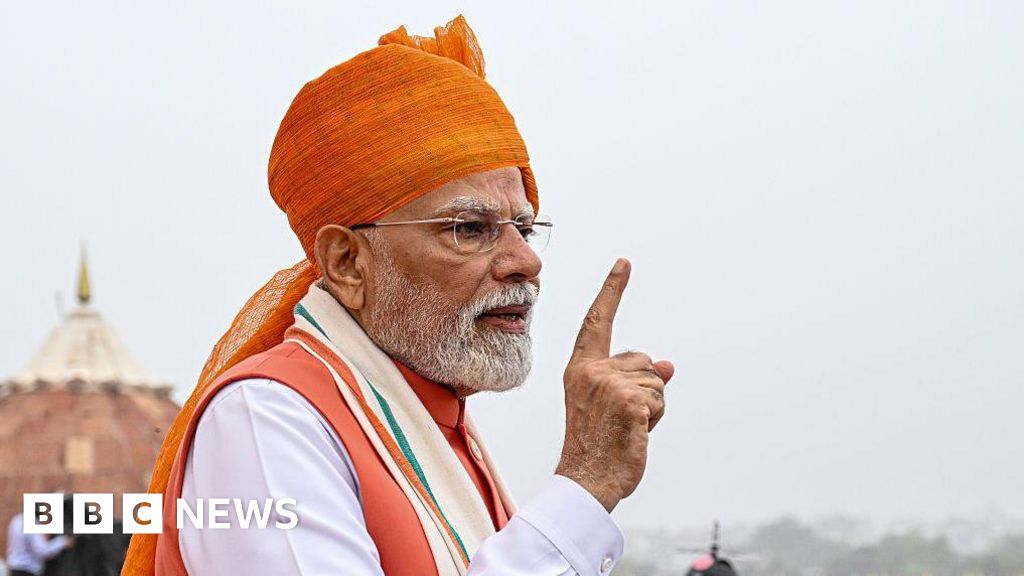US tariffs of 50% on goods from India took effect on Wednesday as Donald Trump sought to punish Delhi for buying Russian oil and weapons.
The tariffs – among the highest in the world – include a 25% penalty for transactions with Russia that are a key source of funds for its war in Ukraine.
India, a vital strategic US partner in the Indo-Pacific, has shown no signs of stopping its purchases, calling the tariffs unfair and vowing to choose the best deal on buying oil to protect its 1.4 billion people.
But there are fears exports and growth in the world's fifth largest economy could suffer. The US was, until recently, India's largest trading partner.
The tariff setback has sent the Indian government into firefighting mode.
Earlier this month, Prime Minister Narendra Modi promised to cut taxes to mitigate the impact of the tariffs which will disrupt millions of livelihoods across the country's export-driven industries that supply everything from clothes to diamonds and shrimp to American consumers.
He said a Diwali gift in the form of a massive tax bonanza was on its way for the common man and the millions of small businesses that power Asia's third largest economy.
Wearing a bright saffron turban and addressing crowds of spectators from the ramparts of Delhi's Red Fort during Independence Day celebrations, Modi also urged small shop owners and businesses to put up boards of Swadeshi or Made in India outside their stores.
We should become self-reliant - not out of desperation, but out of pride, he said. Economic selfishness is on the rise globally and we mustn't sit and cry about our difficulties, we must rise above and not allow others to hold us in their clutches.
He has since repeated these comments in at least two other public addresses this week, emphasizing the need for both producing and spending in India.
Despite ongoing government efforts, manufacturing's share of India's GDP has stagnated at 15% levels even with various subsidies and production incentives.
Experts suggest that long-pending tax reforms could help mitigate the economic blow.
In light of the tariffs, Modi is targeting an overhaul of India's indirect tax system, including a reduction in the Goods and Services Tax (GST) to ease business compliance.
Analysts expect these measures could provide a timely stimulus to boost consumption in the economy, especially as the festive season approaches.
The tariffs – among the highest in the world – include a 25% penalty for transactions with Russia that are a key source of funds for its war in Ukraine.
India, a vital strategic US partner in the Indo-Pacific, has shown no signs of stopping its purchases, calling the tariffs unfair and vowing to choose the best deal on buying oil to protect its 1.4 billion people.
But there are fears exports and growth in the world's fifth largest economy could suffer. The US was, until recently, India's largest trading partner.
The tariff setback has sent the Indian government into firefighting mode.
Earlier this month, Prime Minister Narendra Modi promised to cut taxes to mitigate the impact of the tariffs which will disrupt millions of livelihoods across the country's export-driven industries that supply everything from clothes to diamonds and shrimp to American consumers.
He said a Diwali gift in the form of a massive tax bonanza was on its way for the common man and the millions of small businesses that power Asia's third largest economy.
Wearing a bright saffron turban and addressing crowds of spectators from the ramparts of Delhi's Red Fort during Independence Day celebrations, Modi also urged small shop owners and businesses to put up boards of Swadeshi or Made in India outside their stores.
We should become self-reliant - not out of desperation, but out of pride, he said. Economic selfishness is on the rise globally and we mustn't sit and cry about our difficulties, we must rise above and not allow others to hold us in their clutches.
He has since repeated these comments in at least two other public addresses this week, emphasizing the need for both producing and spending in India.
Despite ongoing government efforts, manufacturing's share of India's GDP has stagnated at 15% levels even with various subsidies and production incentives.
Experts suggest that long-pending tax reforms could help mitigate the economic blow.
In light of the tariffs, Modi is targeting an overhaul of India's indirect tax system, including a reduction in the Goods and Services Tax (GST) to ease business compliance.
Analysts expect these measures could provide a timely stimulus to boost consumption in the economy, especially as the festive season approaches.




















